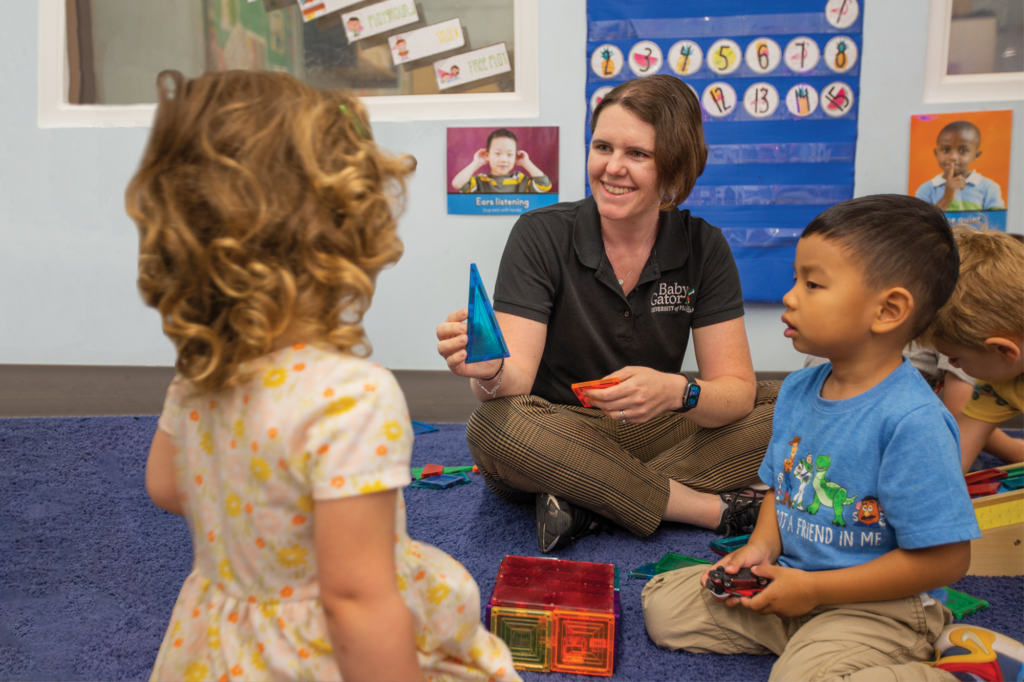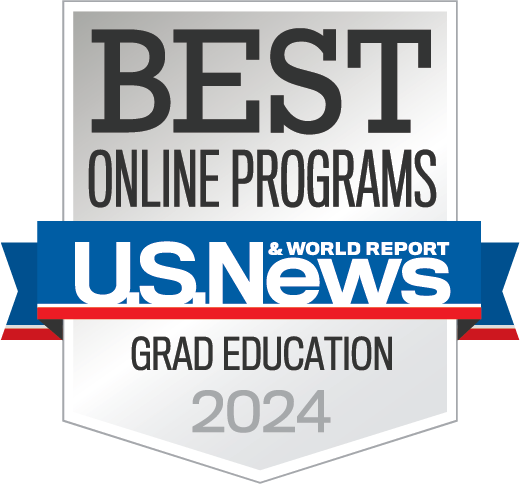Master of Arts with an Early Childhood Emphasis
The Master of Arts in Education (MAE) program with an emphasis in early childhood is designed for applicants who have an interest in working on issues of practice or policy as they relate to early childhood. The MAE is offered in three tracks: an on-campus track focused on early childhood and two asynchronous online tracks. The program does not lead to teacher certification and is not an initial teacher preparation program.
Early Childhood Studies Track (On-Campus Courses)

The early childhood studies track includes coursework focused on the practice of early childhood education, intervention, and service provision. Coursework (see below) includes a focus on early childhood curriculum, child development, and effective early childhood instructional methods. An applicant who chooses this program track may plan to pursue a future doctorate, may intend to engage in coaching with teachers or parents, or may endeavor to become a better teacher or administrator. This program has a focus on birth through kindergarten.
On-Campus Courses (Traditional Early Childhood Track)
Fall Year 1
- EEC 6205 – Early Childhood Curriculum
- EEC 6933 – Special Topics (or Child Development Course)
- EEC 6905 – Practicum in Early Childhood
- EEC 6933 – Early Childhood Seminar for MAE & Doctoral Students
Spring Year 1
- EEC 6933 – Instructional Methods for Young Children
- EDF 6403 – Quantitative Foundation of Educational Research
Summer Year 1
- Elective or Early Childhood Specialization Courses
Fall Year 2
- EEC 6933 – Families & Diversity in Early Childhood Studies
- EEX 6971 – Thesis or EEX 6905 – Project Research
- Elective or Early Childhood Specialization Course
Spring Year 2
- EEC 7056 – Policy & Advocacy in Early Childhood Studies
- EEC 6933 – Early Childhood Assessment & Evaluation
- EEX 6971 – Thesis or EEX 6905 – Project Research
Early Childhood Policy Track (Online Courses)

This program track focuses on the policy context of early childhood from birth through kindergarten through interdisciplinary coursework in early childhood policy and educational leadership (see course sequence below). Upon graduation, an applicant who chooses this program may plan to pursue a future doctorate degree or seek new early childhood policy-focused career opportunities with school districts across the United States, U.S./state-level Departments of Education, Health and Human Services, etc., legislative or congressional offices, judicial offices, social service agencies with advocacy departments, state or federal education policy organizations, non-governmental agencies for education, health, mental health, housing, and/or legal services, international agencies (e.g., World Bank, United Nations, World Health Organization), family advocacy programs, early childhood organizations (e.g., NAEYC, Zero to Three), philanthropic foundations, or research institutions or think tanks focused on policy research (e.g., AIR, Child Trends).
Online Courses (Early Childhood Policy Track)
Fall Year 1
- EEC 6665 – History, Child Development, & Equity in Early Childhood Policy
- EDA 6069 – Educational Policy Analysis
- Elective
Spring Year 1
- EEC 6636 – Examining Practices, Policies, and Key Issues in Early Childhood Policy
- EDG 6285 – Evaluation in School Programs
- EEC 7056 – Early Childhood Policy and Advocacy
Summer Year 1
- EEC6667 – Theory & Analysis in Early Childhood Policy
Fall Year 2
- EEC 6933 – Internship and Seminar in Early Childhood Policy
- Elective
- Elective
Spring Year 2
- EEX 6971 – Thesis or EEX 6905 – Project Research
Early Childhood Practitioner Leader (online courses)

The early childhood practitioner leader track includes coursework focused on the practice of early childhood care and education related to early learning and development. This track is focused on birth through age eight. Coursework (see below) includes a focus on early childhood curriculum, child development, and effective early childhood instructional and assessment methods. An applicant who chooses this program track is a current practitioner or has plans to become a practitioner with focused leadership intentions related to curriculum, instruction, and early childhood practices.
Online Courses (Early Childhood Practitioner Leader Track)
Fall Year 1: 6 credit hours
- EEC 6615 – Early Childhood Background and Concepts (Fall A) (3 credit hours)
- EEC 6205 – Early Childhood Curriculum (Fall B) (3 credit hours)
Spring Year 1: 9 credit hours
- EEC6933 – Elective (3 credit hours)
- EEC 6933 – Families as a Context in Early Childhood Studies (3 credit hours)
- EEC 6933 – Assessment & Evaluation in EC Settings (3 credit hours)
Summer Year 1: 6 credit hours
- EEC 6667 – Theory & Analysis in Early Childhood Policy (3 credit hours)
- EDE 6325 – Teacher Inquiry / Action Research (3 credit hours)
Fall Year 2: 9 credit hours
- EEC 6933 – Elective (3 credit hours)
- EDF 6400 – Foundations in Educational Research: Overview (3 credit hours)
- EEC 6905 – Individual Work (3 credit hours)
Spring Year 2: 6 credit hours
- EEC 6905 – Individual Work (3 credit hours)
- EEC 6933 – Elective (3 credit hours)
Total: 36 hours
Admission Requirements
- Application for admission into the Graduate School. https://admissions.ufl.edu/apply/graduate/
- Application fee (can be paid online via the application system or by check or money order)
- Résumé*
- Official transcripts from colleges/ universities previously attended*
- Three letters of recommendation
- At least two letters must be from academic and/ or work related recommenders
- Can be submitted electronically via the application system or as hard copies
- International Applicants must provide additional documentation including acceptable TOEFL, MELAB, or IETS scores. Additional detail about international application requirements is available at: http://www.admissions.ufl.edu/intl/admissioninfo.html
- TOEFL: Paper Based-550 Computer Based-213 Internet Based-80
- IELTS: 6
*Pursuant to Florida Statute, your application requires inclusion of all post-high school education and employment, as well as information about ongoing international affiliations and research funding. Please ensure this information is included on your curriculum vitae (CV) or résumé.
Stipends Available
A limited number of stipends are available to admitted students, covering 50% of tuition costs. Please contact admissions for more information regarding this stipend!





